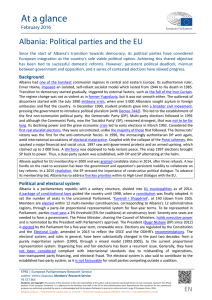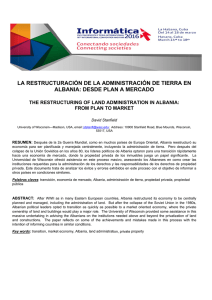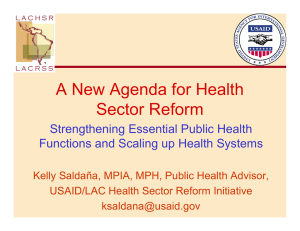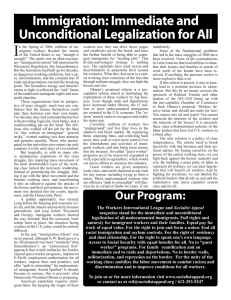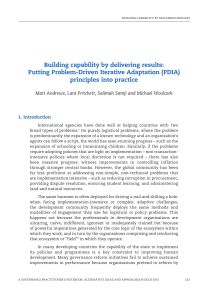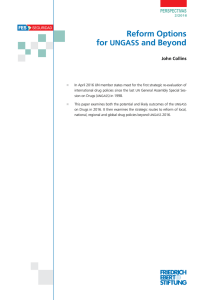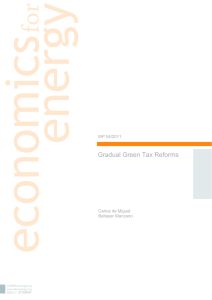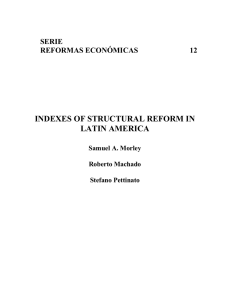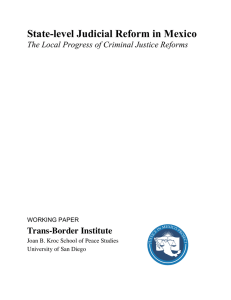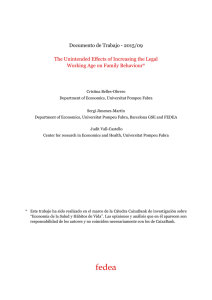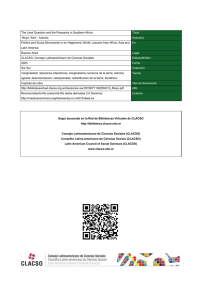EP Research note on Albania - European Parliament
Anuncio
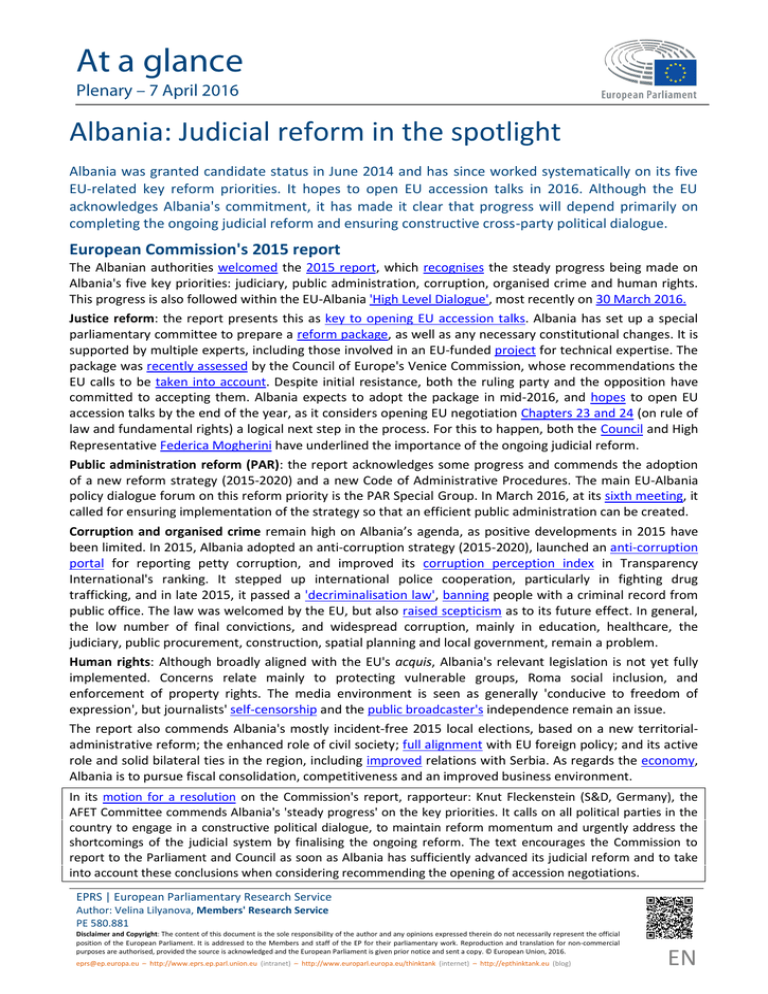
At a glance Plenary – 7 April 2016 Albania: Judicial reform in the spotlight Albania was granted candidate status in June 2014 and has since worked systematically on its five EU-related key reform priorities. It hopes to open EU accession talks in 2016. Although the EU acknowledges Albania's commitment, it has made it clear that progress will depend primarily on completing the ongoing judicial reform and ensuring constructive cross-party political dialogue. European Commission's 2015 report The Albanian authorities welcomed the 2015 report, which recognises the steady progress being made on Albania's five key priorities: judiciary, public administration, corruption, organised crime and human rights. This progress is also followed within the EU-Albania 'High Level Dialogue', most recently on 30 March 2016. Justice reform: the report presents this as key to opening EU accession talks. Albania has set up a special parliamentary committee to prepare a reform package, as well as any necessary constitutional changes. It is supported by multiple experts, including those involved in an EU-funded project for technical expertise. The package was recently assessed by the Council of Europe's Venice Commission, whose recommendations the EU calls to be taken into account. Despite initial resistance, both the ruling party and the opposition have committed to accepting them. Albania expects to adopt the package in mid-2016, and hopes to open EU accession talks by the end of the year, as it considers opening EU negotiation Chapters 23 and 24 (on rule of law and fundamental rights) a logical next step in the process. For this to happen, both the Council and High Representative Federica Mogherini have underlined the importance of the ongoing judicial reform. Public administration reform (PAR): the report acknowledges some progress and commends the adoption of a new reform strategy (2015-2020) and a new Code of Administrative Procedures. The main EU-Albania policy dialogue forum on this reform priority is the PAR Special Group. In March 2016, at its sixth meeting, it called for ensuring implementation of the strategy so that an efficient public administration can be created. Corruption and organised crime remain high on Albania’s agenda, as positive developments in 2015 have been limited. In 2015, Albania adopted an anti-corruption strategy (2015-2020), launched an anti-corruption portal for reporting petty corruption, and improved its corruption perception index in Transparency International's ranking. It stepped up international police cooperation, particularly in fighting drug trafficking, and in late 2015, it passed a 'decriminalisation law', banning people with a criminal record from public office. The law was welcomed by the EU, but also raised scepticism as to its future effect. In general, the low number of final convictions, and widespread corruption, mainly in education, healthcare, the judiciary, public procurement, construction, spatial planning and local government, remain a problem. Human rights: Although broadly aligned with the EU's acquis, Albania's relevant legislation is not yet fully implemented. Concerns relate mainly to protecting vulnerable groups, Roma social inclusion, and enforcement of property rights. The media environment is seen as generally 'conducive to freedom of expression', but journalists' self-censorship and the public broadcaster's independence remain an issue. The report also commends Albania's mostly incident-free 2015 local elections, based on a new territorialadministrative reform; the enhanced role of civil society; full alignment with EU foreign policy; and its active role and solid bilateral ties in the region, including improved relations with Serbia. As regards the economy, Albania is to pursue fiscal consolidation, competitiveness and an improved business environment. In its motion for a resolution on the Commission's report, rapporteur: Knut Fleckenstein (S&D, Germany), the AFET Committee commends Albania's 'steady progress' on the key priorities. It calls on all political parties in the country to engage in a constructive political dialogue, to maintain reform momentum and urgently address the shortcomings of the judicial system by finalising the ongoing reform. The text encourages the Commission to report to the Parliament and Council as soon as Albania has sufficiently advanced its judicial reform and to take into account these conclusions when considering recommending the opening of accession negotiations. EPRS | European Parliamentary Research Service Author: Velina Lilyanova, Members' Research Service PE 580.881 Disclaimer and Copyright: The content of this document is the sole responsibility of the author and any opinions expressed therein do not necessarily represent the official position of the European Parliament. It is addressed to the Members and staff of the EP for their parliamentary work. Reproduction and translation for non-commercial purposes are authorised, provided the source is acknowledged and the European Parliament is given prior notice and sent a copy. © European Union, 2016. eprs@ep.europa.eu – http://www.eprs.ep.parl.union.eu (intranet) – http://www.europarl.europa.eu/thinktank (internet) – http://epthinktank.eu (blog) EN
